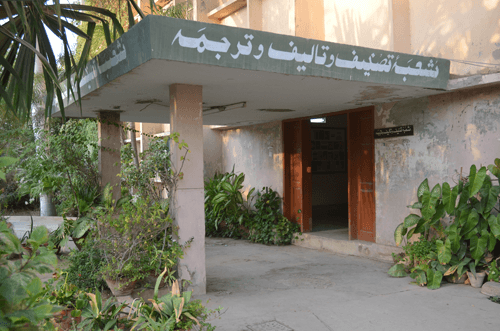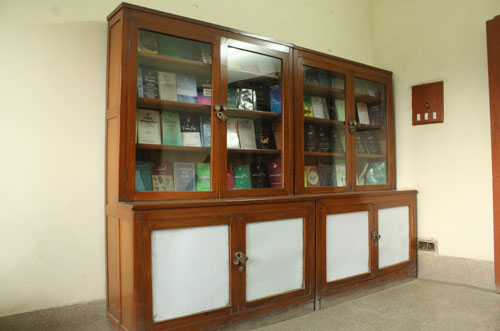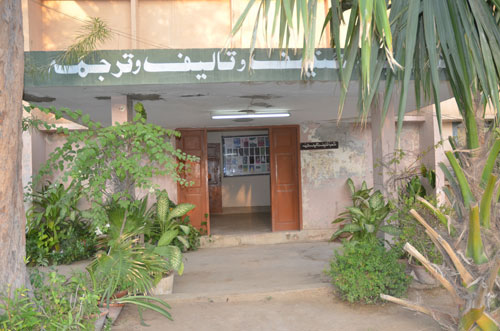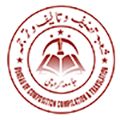In 1957-58, the Bureau of Composition, Compilation and Translation was established, Major Aftab Hasan was appointed as the Honorary Director of the bureau. The main objectives of the bureau of composition, compilation and translation included vocabulary containing Urdu synonyms of technical terms, Urdu translation of textbooks of various subjects and classical literature of foreign languages into Urdu language and translation of Urdu classical literature into other languages. Initially, the work of transferring only the technical terms into Urdu language was started. Ten committees were formed for this work, out of which 9 had started their work. About four thousand Urdu terms were compiled in 1957-58. In the beginning, the current building of the bureau was allocated as Placement Bureau and later as a residence for female students, after the establishment of the bureau in 1957-58, the Bureau of Composition, Compilation and Translation was established in the said building.
Under the main objectives of the bureau, around 19 Farhangs based on various technical terms have been published so far. The Bureau of Composition, Compilation and Translation has also published a magazine “Jareeda” to spread the terms on a regular basis, of which 37 volumes have been published so far. Major Aftab Hasan, Ali Arif Rizvi and Tariq Mehmood’s farhangs on various subjects are worth mentioning among the Farhangs of the bureau. On the other hand, the Bureau of Composition, Compilation and Translation has so far published about one and a half hundred publications and Urdu translations of various works, which are not only based on the works of the teachers of University of Karachi, but also in them for the promotion of Urdu language. The writings of renowned researchers, critics and intellectuals of the country are also included.
In order to meet the printing needs of the University of Karachi in 1988, a printing press was purchased for the University of Karachi under the vice-chancellorship of Prof. Dr. Manzooruddin Ahmad, whose responsibilities were to carry out all the printing works of the University of Karachi, which not only had to deal with the problems of transportation, but on the other hand had to save a lot of money paid to the printing presses of the city. The Press of the Bureau not only fulfilled these responsibilities well but also tried to establish printing relations with educational institutions outside the university so that more sources of income could be available to the University of Karachi. Going further in 1999, under the Resolution No. 3, dated 14, October 1999 of the Syndicate of the University of Karachi, the Bureau of Composing, Compilation, Translation and BCC & T Press was merged to establish “Karachi University Press”, the main objective of which was to the source of income of Karachi University was to be further increased. Under the same objectives, the Karachi University Press has so far visited other educational institutions of the city, including: Oxford University Press; IBA, ICAP, Federal Urdu University of Arts, Science and Technology, Shaheed Zulfiqar Ali Bhutto University and Benazir Bhutto Shaheed University, Lyari has made it possible to obtain the printing work.
In April, a department-run website was set up to provide information on all the department’s publications, as well as to receive requests for delivery and to make delivery possible. Continuing this line, steps were taken to make information about future publications a part of this website in March 2020, so that readers of Karachi University publications can now receive their favourite publications at home. They can also be aware of the future publication plan of the Bureau of Composition, Compilation and Translation / Karachi University Press.
In 1999, the Syndicate of Karachi University merged the Department of Composition, Compilation and Translation (BCC & T) and its printing press (BCC & T Press) under its clause No. 3 of October 14, 1999 to form Karachi University Press. Deciding to set up a new body, the syndicate also clarified in its decision that the KUP would be fully administered by the University of Karachi and would not have a separate board of executive and selection board. It was also decided that steps should be taken to run Karachi University Press on a fully commercial basis so that Karachi University Press could become a source of income for Karachi University.



Therefore, under the same decision, Karachi University Press made efforts to obtain printing works from various educational and publishing institutions. Responsibilities were assigned which made it possible for Karachi University to earn a decent income.In pursuance of the objective of establishing Karachi University Press, re-liaison with the above mentioned institutions is being made possible for the attainment of printing work and other publishing houses are also being invited to publish their publications at Karachi University Press. Contact them so that they can be provided with printing facilities in the best possible, earliest and best environment.

